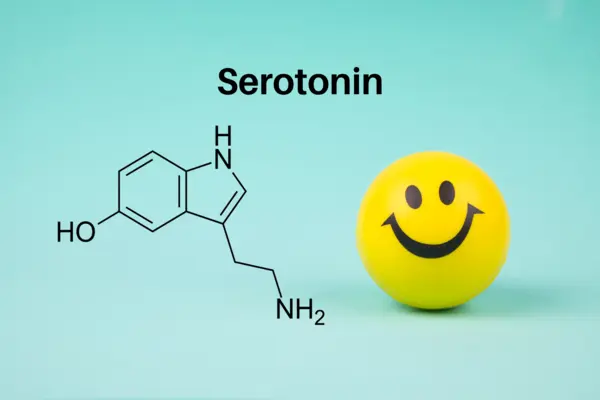Social Hierarchy: The Role of Serotonin in Social Dominance
Serotonin, dominance, social hierarchy, and lobsters. How could these words be the main keywords of an article? Let’s see!
In the intricate web of human interactions, social hierarchies play a significant role in shaping behaviors and relationships. Indeed, domination hierarchies impact daily life, from boardrooms of multinational corporations to playgrounds of elementary schools.
But what underpins these social hierarchies?
Science has examined the neural mechanisms that govern social dominance, with one neurotransmitter, in particular, standing out: serotonin.
The Essence of Social Hierarchy
Social hierarchy can be understood as an individual’s perceived rank within a social group. It’s not just about physical power or strength; it’s about influence, control, and status.
This perception is often a combination of self-assessment and feedback from the group. Someone could feel dominant because he holds a leadership position in a group, or he might feel subordinate because he is new or less experienced.
Mental States and Guiding Behaviors
The feeling of dominance or subordination is deeply rooted in our psyche. When an individual feels subordinate often experiences feelings of inferiority, passivity, or even resentment.
On the other hand, feeling dominant can lead to a sense of confidence, control, and assertiveness. This individual believes he has the authority to influence decisions and guide group dynamics.
Not only does he believe it but, usually, other people believe it as well. Strange, isn’t it?

As you can see, this perception of dominance or subordination isn’t passive; it actively guides our behaviors. A subordinate individual might be more reserved, seeking approval before taking action while the dominant individual will make decisions on behalf of the group.
But why is this happening?
Why some people are leaders and others are followers?
And more importantly, why the same person could be both a leader and a follower in a short time?
Okay sure this is too complex to be solved in just one article. But, at least, we can see whether serotonin (or other neural mechanisms) can make humans more dominant.
Serotonin: The Chemical of Dominance
Recent advances in neuroimaging and molecular technology have shed light on the neural substrates supporting the perception of social dominance. Broad brain regions, including the amygdala, hippocampus, striatum, and various cortical networks, have been identified as key players in dominance perception.
However, it’s not just about these brain regions; it’s also about the chemicals that facilitate communication between them. This is where neurotransmitters, especially serotonin, come into play.
Serotonin, a neurotransmitter widely distributed in the brain, plays a significant role in mood regulation, appetite, sleep, and, importantly, social behavior. Its role in social dominance has been a subject of keen interest for many years.
The research of serotonin dominance
The link between serotonin and dominance has been a focal point in both animal and human studies:
- Animal Studies: In non-human primates, like monkeys, dominant individuals often exhibit higher levels of serotonin metabolites in their cerebrospinal fluid. This isn’t just a correlation; experiments have shown that manipulating serotonin levels can directly influence dominance behaviors. As a result, reducing serotonin levels can make a previously dominant monkey more submissive.
- Human Implications: In humans, the dynamics are more complex due to the intricacies of our social structures. However, the serotonergic system still plays a pivotal role in shaping social hierarchies. People with naturally higher serotonin levels often exhibit behaviors associated with dominance, such as assertiveness, confidence, and leadership. On the flip side, lower serotonin levels are frequently linked to passive behaviors.
But what do all these mean in terms of social hierarchy?
Role of Serotonin in Social Hierarchy
The brain constantly processes information to help us understand our environment, including our position within social groups. This understanding is not static; it evolves based on new interactions and experiences.
The process of assimilating this information and adjusting our perception of social ranks is termed as “computations” in the context of the research.
The research underscores that serotonin is not just a passive bystander in these computations. Instead, it actively influences how we process social interactions, learn from them, and subsequently determine our position (or the position of others) in a social hierarchy.
To get a better understanding of this we employ the beautiful writing of Jordan Peterson about lobsters (!)
Jordan Peterson’s Theory on Lobster Hierarchy and Serotonin
In his book “12 Rules for Life: An Antidote to Chaos,” Jordan Peterson discusses the behavior of lobsters as an analogy for understanding human social hierarchies.
So, within his first chapter, the author explains that lobsters, like many animals, have dominance hierarchies. They compete for the best hiding spots, which provide protection from predators and access to food. The outcome of these competitions determines their rank in the hierarchy.
Dominant lobsters tend to have an upright and expansive posture, with their claws held high and antennae extended. In contrast, subordinate lobsters adopt a more constricted posture, appearing smaller and more defensive.
Peterson highlights that serotonin plays a crucial role in this behavior. Dominant lobsters have higher levels of serotonin, which corresponds to their confident posture and aggressive behavior.
When a lobster wins a fight, its serotonin levels increase, reinforcing its dominant status. Conversely, a lobster that loses a fight experiences a drop in serotonin levels, leading to a more submissive posture and behavior.

Jordan Peterson draws parallels between lobsters and humans, suggesting that, like lobsters, humans also have social hierarchies influenced by serotonin. He posits that individuals with higher serotonin levels tend to be more confident, assertive, and dominant, while those with lower levels might be more passive.
Moreover, the author emphasizes that dominance hierarchies are not a human invention but have deep evolutionary roots. The fact that lobsters, which have been around for hundreds of millions of years, exhibit similar behaviors underscores the ancient and fundamental nature of these hierarchies.
So, drawing from the lobster analogy, Peterson extracts his first rule for life: “STAND UP STRAIGHT WITH YOUR SHOULDERS BACK“.
He suggests that adopting an upright posture can boost confidence, potentially influencing serotonin levels and one’s position in social hierarchies.
Interesting huh?
And this is what we call “bi-directional”.
Serotonin – Dominance: Bi-directional Relationship
One of the fascinating aspects of the serotonin-dominance relationship is its bi-directionality. While serotonin levels can influence dominance behaviors, one’s position in a social hierarchy can also influence serotonin levels. This dynamic interplay suggests that our social environment and our neurochemistry are deeply intertwined.
This is super interesting because it means that we have some control over our social hierarchy.
How? It’s simple, by keeping high serotonin levels.
Yes, keeping high serotonin levels will maintain our dominance in social hierarchy or even enhance it! And the dominance will raise the serotonin levels, which will enhance the dominance even more. It’s a loop!
(This is what is called a Positive Feedback Loop: when the product of a process leads to an increase of the process. More product -> more process -> even more product -> even more process…)
Dominance by Boosting Serotonin
Having said that, it’s now more than useful to provide some ways to boost serotonin naturally:
1. Dietary Choices
- Complex Carbohydrates: Foods like whole grains, fruits, vegetables, and legumes can increase serotonin production by aiding the transport of tryptophan to the brain.
No, just eating tryptophan-Rich Foods, will not boost your serotonin! (It will be explained in a future article)
- Omega-3 Fatty Acids: Found in fatty fish, flaxseeds, and walnuts, omega-3s have been linked to increased serotonin production.
2. Exposure to Sunlight
Natural sunlight can boost serotonin levels. Generally, spending time outdoors during daylight hours, even on cloudy days, can help.
3. Regular Exercise
Physical activity, especially aerobic exercises like walking, running, cycling, and swimming, can elevate serotonin levels and enhance its activity in the brain.
Check here the article The Chemical Profile of One Workout, for more information.
4. Massage
Some studies suggest that massage therapy can increase serotonin levels while decreasing the stress hormone cortisol.
5. Meditation and Mindfulness
Practices like meditation, deep breathing exercises, and yoga can elevate serotonin levels by reducing stress and promoting relaxation.
6. Positive Social Interactions
Engaging in positive social interactions and maintaining strong social bonds can boost serotonin levels. This includes spending time with loved ones, engaging in group activities, or even petting animals.
7. Maintain a Regular Sleep Schedule
Proper sleep can help regulate serotonin levels. It’s essential to maintain a consistent sleep schedule and ensure you’re getting adequate rest.
8. Small wins
Last but not least, get some wins. Humans, like lobsters, experience a boost in serotonin levels after a win. These wins, apart from increasing the serotonin levels, will make you stand straight, and more confident! Again, this will lead to new wins, more serotonin, and why not a better position in your social circle.
Small wins are really powerful and, most importantly, can be scheduled! A small win could be a difficult discussion that you avoid, the morning exercise that you always skip, making some acquaintances at a social event, or just finishing that book lying next to your bed for the last 7 months.
Start looking for small wins in your life and thank me later!
Thanks for reading an article about lobsters, serotonin, dominance, and social hierarchies. 😅
If you are that strange you should follow us on social media!
References
- https://www.ncbi.nlm.nih.gov/pmc/articles/PMC4469834/
- https://onlinelibrary.wiley.com/doi/full/10.1111/jnc.15607
- https://www.ncbi.nlm.nih.gov/pmc/articles/PMC9630526/
- https://pubmed.ncbi.nlm.nih.gov/1794096/
- https://pubmed.ncbi.nlm.nih.gov/6444893/
- https://pubmed.ncbi.nlm.nih.gov/7597125/
- https://www.academia.edu/71914414/The_reciprocal_interaction_between_serotonin_and_social_behaviour



